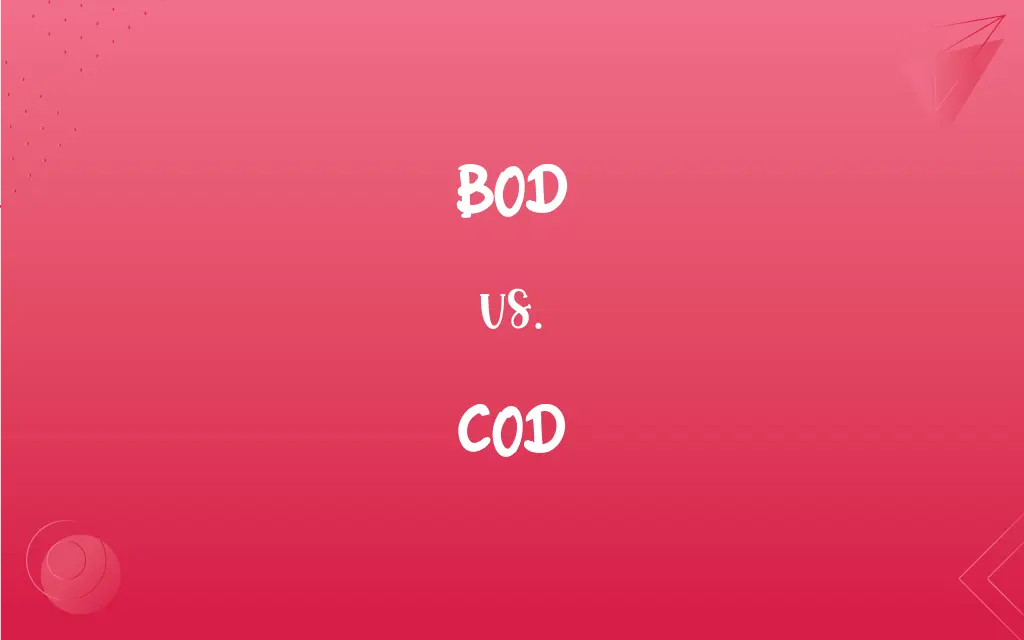BOD vs. COD: What's the Difference?
Edited by Harlon Moss || By Janet White || Published on February 18, 2024
BOD (Biochemical Oxygen Demand) measures organic matter biodegradability in water, while COD (Chemical Oxygen Demand) gauges total organic matter, including non-biodegradable.

Key Differences
BOD (Biochemical Oxygen Demand) is a biological process that measures the amount of oxygen required by microorganisms to decompose organic matter in water. It's indicative of the biodegradable organic content. Conversely, COD (Chemical Oxygen Demand) is a chemical process that measures the total amount of oxygen required to chemically oxidize both biodegradable and non-biodegradable organic substances in water. It represents the total organic content.
BOD is specifically crucial in assessing the impact of effluent on the natural aquatic environment, reflecting the organic pollution level that can be biologically broken down. On the other hand, COD offers a broader measure of water pollution, encompassing all organic pollutants, and is typically higher than BOD as it includes substances that are not readily biodegradable.
The test duration is a significant difference; BOD testing typically takes five days (BOD5) to yield results, reflecting a slower biological process. In contrast, COD testing is much faster, often completed within a few hours, due to its chemical methodology, making it a quicker indicator of water quality.
Regarding sensitivity to specific pollutants, BOD is not as sensitive to certain types of organic compounds, such as those that are slow to biodegrade. In contrast, COD measures all organic compounds, providing a more comprehensive assessment of water pollution, including toxic substances that might not affect BOD.
In terms of application, BOD is commonly used in wastewater treatment to evaluate treatment efficiency and the potential impact on receiving waters. COD is more versatile, used not only in wastewater treatment but also in industrial processes to monitor and control organic pollutants in effluent.
ADVERTISEMENT
Comparison Chart
Measurement Focus
Biodegradable organic matter
Total organic matter
Methodology
Biological
Chemical
Test Duration
Typically 5 days
Several hours
Sensitivity
Less sensitive to non-biodegradable organics
Sensitive to all organic compounds
Application
Wastewater treatment, environmental impact
Wastewater treatment, industrial monitoring
ADVERTISEMENT
BOD and COD Definitions
BOD
A man's body.
He admired his BOD in the mirror after a workout.
COD
An acronym for "Call of Duty", a popular video game series.
He spent the whole night playing COD with his friends.
BOD
A term of endearment, often used in a playful or affectionate manner.
Hey BOD, are you coming to the party tonight?
COD
A fish species, known for its culinary uses.
She ordered grilled COD for dinner.
BOD
A colloquial term for a person, often used informally.
I saw this BOD at the store who looked exactly like you!
COD
Abbreviation for "Cash on Delivery", a payment method.
I prefer COD for online shopping to ensure product quality.
BOD
An informal term for a friend or acquaintance.
BOD, let's catch up over coffee this weekend.
COD
Abbreviation for "Cause of Death" in forensic contexts.
The autopsy report will confirm the COD.
BOD
An abbreviation for "Board of Directors".
The BOD will meet next week to discuss the merger.
COD
Used in legal contexts, standing for "Certificate of Deposit".
They decided to invest their savings in a COD for better interest rates.
COD
See Atlantic cod.
FAQs
Where is BOD testing commonly applied?
In wastewater treatment and environmental assessment.
What is the primary use of BOD testing?
To measure biodegradable organic matter in water.
What does BOD stand for?
Biochemical Oxygen Demand.
How long does a BOD test typically take?
Five days.
Can COD testing detect toxic substances?
Yes, it can detect both biodegradable and toxic substances.
Is BOD more sensitive to biodegradable or non-biodegradable substances?
Biodegradable substances.
What does COD measure in water?
Total organic matter, both biodegradable and non-biodegradable.
Is BOD testing suitable for industrial effluent?
It's more suited for environmental impact, less for industrial monitoring.
How is COD testing conducted?
Through a chemical process.
Is COD always higher than BOD?
Generally, yes, as it measures all organic compounds.
Why is BOD important in wastewater treatment?
To evaluate treatment efficiency and environmental compliance.
Is BOD or COD more relevant for regulatory compliance?
Depends on the specific environmental regulations and context.
What does COD stand for?
Chemical Oxygen Demand.
Does BOD reflect the potential impact on aquatic life?
Yes, it assesses organic pollution biodegradability affecting aquatic life.
Does COD offer a comprehensive water pollution assessment?
Yes, it measures the total organic content, including non-biodegradable.
What is the significance of the difference between BOD and COD values?
It indicates the proportion of biodegradable vs. non-biodegradable organic matter.
Can COD be used to monitor industrial processes?
Yes, it's useful for industrial monitoring and control.
Are there substances that affect COD but not BOD?
Yes, such as certain toxic and non-biodegradable compounds.
Can BOD and COD be used together for water quality analysis?
Yes, they provide complementary information.
Is COD testing faster than BOD testing?
Yes, it typically takes several hours.
About Author
Written by
Janet WhiteJanet White has been an esteemed writer and blogger for Difference Wiki. Holding a Master's degree in Science and Medical Journalism from the prestigious Boston University, she has consistently demonstrated her expertise and passion for her field. When she's not immersed in her work, Janet relishes her time exercising, delving into a good book, and cherishing moments with friends and family.
Edited by
Harlon MossHarlon is a seasoned quality moderator and accomplished content writer for Difference Wiki. An alumnus of the prestigious University of California, he earned his degree in Computer Science. Leveraging his academic background, Harlon brings a meticulous and informed perspective to his work, ensuring content accuracy and excellence.































































